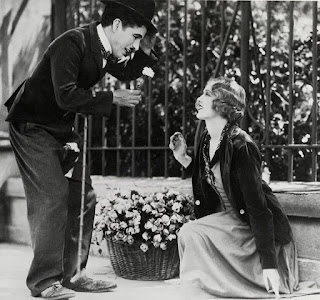In Film Comment, October 1972, the renowned critic Stanley Kauffmann gave his thoughts about Charlie's 1931 movie "City Lights." Here are some excerpts from that which I find interesting and thought-provoking.
Chaplin had a lot of trouble with Virginia Cherrill and tried to replace her during the lengthy shooting. This backstage story makes the results all the more astonishing. Chaplin got an extremely good performance from her. Without it, the last scene would have been impossible. When the (even more) ragged Tramp stares happily at her through the shop window, she says to her assistant, "I've made a conquest," with just the right touch of haughty pleasure, the slight air of cruelty in the formerly maimed person made whole. A moment later, when she takes his hand and recognizes him by touch, she becomes her former self, but larger. He says, "You can see now?" Her face - on the reply, "Yes, I can see now" - is beautiful. The film has to end with a close-up of Charlie - we'd feel cheated otherwise - but, dramatically, the last scene is hers.
Chaplin did not always succeed as a director, or discoverer, of actresses. Merna Kennedy in "The Circus" is a dud, as is Marilyn Nash in "Monsieur Verdoux." But when he succeeded, as with Georgia Hale in "the Gold Rush" and Cherrill here, he transformed them into something they never touched again.
One more section of Kauffmann's article I want to include here:
Sentiment is the burden and the blessing of Chaplin's work. The durability of the sentimental passages may be a chief secret of his survival. Of his one-time peers, only Keaton - who really is his peer - is still as affecting. ... In the beginning of "City Lights," when he discovers that the girl is blind, the film seems to stop for a moment. In the last scene, when he gazes at her so selflessly, so happily, he says more than in that whole last speech of "The Great Dictator."


No comments:
Post a Comment